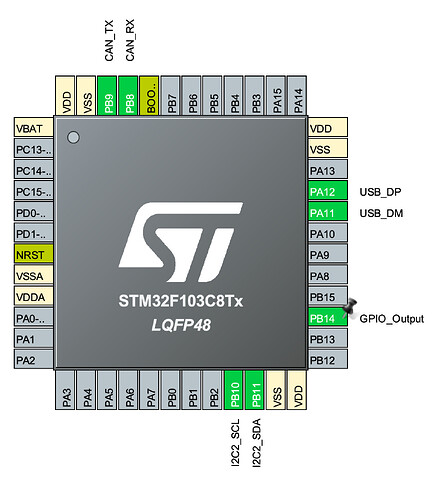@Owen_Williams First of all, thanks for the amazing port for the G431-ESC device! On that base i added simple CAN-bus features to it.
If anyone is interested at it, here is the code for it - i know not the best way to publish source-code in that form ![]() , anyhow here it is:
, anyhow here it is:
SimpleCan.h:
#pragma once
#include "Arduino.h"
#include <stm32g4xx_hal_fdcan.h>
enum CanSpeed
{
Mbit1 = 10,
Kbit500 = 20,
Kbit250 = 40,
Kbit125 = 80
};
/**
CAN wrapper for G431 board.
*/
class SimpleCan
{
public:
class RxHandler
{
public:
RxHandler(uint16_t dataLength, void(*callback)(FDCAN_RxHeaderTypeDef rxHeader, uint8_t *rxData));
~RxHandler();
void notify(FDCAN_HandleTypeDef *hfdcan);
private:
FDCAN_RxHeaderTypeDef _rxHeader;
uint8_t *_rxData;
void(*_callback)(FDCAN_RxHeaderTypeDef, uint8_t *);
};
SimpleCan(bool terminateTransceiver);
HAL_StatusTypeDef init(CanSpeed speed);
HAL_StatusTypeDef configFilter(FDCAN_FilterTypeDef *filterDef);
HAL_StatusTypeDef configGlobalFilter(
uint32_t nonMatchingStd,
uint32_t nonMatchingExt,
uint32_t rejectRemoteStd,
uint32_t rejectRemoteExt);
HAL_StatusTypeDef activateNotification(RxHandler *rxHandler);
HAL_StatusTypeDef deactivateNotification();
HAL_StatusTypeDef start();
HAL_StatusTypeDef stop();
HAL_StatusTypeDef addMessageToTxFifoQ(
FDCAN_TxHeaderTypeDef *pTxHeader,
uint8_t *pTxData);
//private: interrupt handler needs access to it
static FDCAN_HandleTypeDef _hfdcan1;
static RxHandler *_rxHandler;
};
SimpleCan.cpp:
#include "SimpleCan.h"
// will be called from: HAL_FDCAN_Init
extern "C" void HAL_FDCAN_MspInit(FDCAN_HandleTypeDef *hfdcan);
extern "C" void FDCAN1_IT0_IRQHandler();
extern "C" void HAL_FDCAN_RxFifo0Callback(FDCAN_HandleTypeDef *hfdcan, uint32_t RxFifo0ITs);
FDCAN_HandleTypeDef SimpleCan::_hfdcan1 = { };
SimpleCan::RxHandler* SimpleCan::_rxHandler = NULL;
SimpleCan::SimpleCan(bool terminateTransceiver)
{
if (_hfdcan1.Instance != NULL)
{
Error_Handler();
}
_hfdcan1.Instance = FDCAN1;
pinMode(CAN_SHDN, OUTPUT);
pinMode(CAN_TERM, OUTPUT);
digitalWrite(CAN_TERM, terminateTransceiver ? HIGH : LOW);
}
HAL_StatusTypeDef SimpleCan::start(void)
{
digitalWrite(CAN_SHDN, LOW);
return HAL_FDCAN_Start(&_hfdcan1);
}
HAL_StatusTypeDef SimpleCan::stop(void)
{
digitalWrite(CAN_SHDN, HIGH);
return HAL_FDCAN_Stop(&_hfdcan1);
}
HAL_StatusTypeDef SimpleCan::init(CanSpeed speed)
{
FDCAN_InitTypeDef *init = &_hfdcan1.Init;
init->ClockDivider = FDCAN_CLOCK_DIV1;
init->FrameFormat = FDCAN_FRAME_FD_BRS;
init->Mode = FDCAN_MODE_NORMAL;
init->AutoRetransmission = DISABLE;
init->TransmitPause = ENABLE;
init->ProtocolException = DISABLE;
// 1 MBit: NominalPrescaler = 10
// see: http://www.bittiming.can-wiki.info/
// 170MHz / Prescaler / SyncJumpWith / (TimeSeg1 + TimeSeg2 + SyncSeg)
// SyncSeg = SYNC_SEG = 1, TimeSeg1 = PROP_SEG + PHASE_SEG1, TimeSeg2 = PHASE_SEG2
init->NominalPrescaler = (uint16_t) speed;
init->NominalSyncJumpWidth = 1;
init->NominalTimeSeg1 = 14;
init->NominalTimeSeg2 = 2;
init->DataPrescaler = 1;
init->DataSyncJumpWidth = 4;
init->DataTimeSeg1 = 5;
init->DataTimeSeg2 = 4;
init->StdFiltersNbr = 1;
init->ExtFiltersNbr = 0;
init->TxFifoQueueMode = FDCAN_TX_FIFO_OPERATION;
return HAL_FDCAN_Init(&_hfdcan1);
}
HAL_StatusTypeDef SimpleCan::configFilter(FDCAN_FilterTypeDef *filterDef)
{
return HAL_FDCAN_ConfigFilter(&_hfdcan1, filterDef);
}
HAL_StatusTypeDef SimpleCan::configGlobalFilter(
uint32_t nonMatchingStd,
uint32_t nonMatchingExt,
uint32_t rejectRemoteStd,
uint32_t rejectRemoteExt)
{
return HAL_FDCAN_ConfigGlobalFilter(&_hfdcan1, nonMatchingStd, nonMatchingExt, rejectRemoteStd, rejectRemoteExt);
}
HAL_StatusTypeDef SimpleCan::activateNotification(RxHandler *rxHandler)
{
if (_rxHandler != NULL)
{
return HAL_ERROR;
}
#if USE_HAL_FDCAN_REGISTER_CALLBACKS
// This would make interrupt handling much easier and cleaner.
// But how to activate it on Arduino platform?
//_hfdcan1.Instance->RxFifo0Callback = ...;
#endif
_rxHandler = rxHandler;
return HAL_FDCAN_ActivateNotification(&_hfdcan1, FDCAN_IT_RX_FIFO0_NEW_MESSAGE, 0);
}
HAL_StatusTypeDef SimpleCan::deactivateNotification()
{
_rxHandler = NULL;
return HAL_FDCAN_DeactivateNotification(&_hfdcan1, FDCAN_IT_RX_FIFO0_NEW_MESSAGE);
}
HAL_StatusTypeDef SimpleCan::addMessageToTxFifoQ(
FDCAN_TxHeaderTypeDef *pTxHeader,
uint8_t *pTxData)
{
return HAL_FDCAN_AddMessageToTxFifoQ(&_hfdcan1, pTxHeader, pTxData);
}
void HAL_FDCAN_MspInit(FDCAN_HandleTypeDef *hfdcan)
{
if (hfdcan == NULL || hfdcan->Instance != FDCAN1)
{
return;
}
RCC_PeriphCLKInitTypeDef periphClkInit = { };
HAL_RCCEx_GetPeriphCLKConfig(&periphClkInit);
// Initializes the peripherals clocks
periphClkInit.PeriphClockSelection |= RCC_PERIPHCLK_FDCAN;
periphClkInit.FdcanClockSelection = RCC_FDCANCLKSOURCE_PCLK1;
if (HAL_RCCEx_PeriphCLKConfig(&periphClkInit) != HAL_OK)
{
Error_Handler();
}
// Peripheral clock enable
__HAL_RCC_FDCAN_CLK_ENABLE();
__HAL_RCC_GPIOA_CLK_ENABLE();
__HAL_RCC_GPIOB_CLK_ENABLE();
// FDCAN1 GPIO Configuration
// PA11 ------> FDCAN1_RX
GPIO_InitTypeDef GPIO_InitStruct = { 0 };
GPIO_InitStruct.Pin = GPIO_PIN_11;
GPIO_InitStruct.Mode = GPIO_MODE_AF_PP;
GPIO_InitStruct.Pull = GPIO_NOPULL;
GPIO_InitStruct.Speed = GPIO_SPEED_FREQ_HIGH;
GPIO_InitStruct.Alternate = GPIO_AF9_FDCAN1;
HAL_GPIO_Init(GPIOA, &GPIO_InitStruct);
// PB9 ------> FDCAN1_TX
GPIO_InitStruct.Pin = GPIO_PIN_9;
GPIO_InitStruct.Mode = GPIO_MODE_AF_PP;
GPIO_InitStruct.Pull = GPIO_NOPULL;
GPIO_InitStruct.Speed = GPIO_SPEED_FREQ_HIGH;
GPIO_InitStruct.Alternate = GPIO_AF9_FDCAN1;
HAL_GPIO_Init(GPIOB, &GPIO_InitStruct);
// FDCAN1 interrupt Init
HAL_NVIC_SetPriority(FDCAN1_IT0_IRQn, 0, 0);
HAL_NVIC_EnableIRQ(FDCAN1_IT0_IRQn);
}
void FDCAN1_IT0_IRQHandler(void)
{
HAL_FDCAN_IRQHandler(&SimpleCan::_hfdcan1);
}
void HAL_FDCAN_RxFifo0Callback(FDCAN_HandleTypeDef *hfdcan, uint32_t RxFifo0ITs)
{
if ((RxFifo0ITs & FDCAN_IT_RX_FIFO0_NEW_MESSAGE) != RESET)
{
if (SimpleCan::_rxHandler == NULL)
{
return;
}
SimpleCan::_rxHandler->notify(hfdcan);
}
}
SimpleCan::RxHandler::RxHandler(uint16_t dataLength, void (*callback)(FDCAN_RxHeaderTypeDef, uint8_t *))
{
_rxData = new byte[dataLength];
_callback = callback;
}
SimpleCan::RxHandler::~RxHandler()
{
delete[] _rxData;
}
void SimpleCan::RxHandler::notify(FDCAN_HandleTypeDef *hfdcan)
{
if (HAL_FDCAN_GetRxMessage(hfdcan, FDCAN_RX_FIFO0, &_rxHeader, _rxData) != HAL_OK)
{
Error_Handler();
}
if (_callback != NULL)
{
_callback(_rxHeader, _rxData);
}
}

